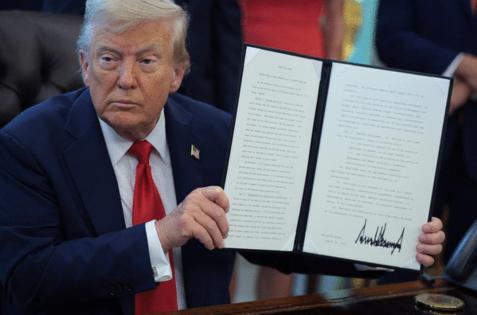Editorial: Trump's war on 'cashless bail' will make the streets less safe
Published in Political News
The Trump administration's next target in its recent law-and-order campaign is non-monetary bail. In his executive order, President Donald Trump has demanded that the federal government remove its aid from jurisdictions that substantially eliminate traditional cash bail.
This will not enhance public safety, because the kind of bail imposed is not the problem in the U.S. pretrial services system. In almost every case where a defendant out on cashless bail commits a serious crime, that defendant would have committed it had they paid cash bail. If the threat of prison time doesn't dissuade someone from committing a crime, money won't do it, either. Further, cash bail is often not the best way to ensure low-risk defendants appear at court.
When defendants on bail commit serious and violent crimes, the problem is typically that they were let out on bail at all. This was the case in Allegheny County during two notorious cashless-bail situations, both involving Lawrenceville-based Magisterial District Judge Xander Orenstein.
In both cases — one involving a major fentanyl dealer, another involving a dangerous police chase — Judge Orenstein ordered non-monetary bail conditions. These decisions were imprudent, but the imprudence was not in the kind of bail imposed, but in approving bail for these dangerous defendants in the first place. Cash bail would not have protected the public.
In both cases, as the Post-Gazette Editorial Board has previously argued, a better decision might have been reached if Allegheny County District Attorney Stephen A. Zappala Jr. sent prosecutors to preliminary arraignments, instead of ceding that moment to pretrial services and defense attorneys.
Indeed, the purpose of bail isn't to protect the public, but to ensure defendants appear at court for their hearings. But there is an obvious injustice in using a financial incentive many defendants can't afford. The practice makes poorer defendants, presumed innocent, far more likely to stay in jail before their trials or to become indebted to bail bondsmen.
Cashless bail, therefore, isn't about leniency, but about seeking ways to ensure appearances at court that don't disproportionately punish poorer defendants who haven't even been convicted of a crime. Justice systems that emphasize cashless bail should not result in more risky defendants awaiting trial in the community. If a defendant is judged to be dangerous to the community, he or she should be remanded to jail.
Judges need both options and the best information possible to know which to use in each case. New York banned cash bail in 2019 for all non-violent offenses — the law has since been revised — and there is some evidence that crime among pretrial defendants increased.
In 2017, New Jersey limited cash bail more sharply than New York without the same effects, because the state increased the amount of information available to decision-makers. The state creates a data-backed risk assessment for its defendants, giving judges an objective public safety analysis to use in deciding whether to grant bail and if so which kind to grant.
Trump is threatening to pull federal funds from jurisdictions that "substantially eliminated cash bail ... for crimes that pose a clear threat to public safety and order." This is a red herring: If judicial systems are letting dangerous criminals roam the streets before trial, the problem is the judges' decision to give them bail. It's not the types of bail on offer. And eliminating all but one won't help.
Forcing reliance on cash bail and thereby forcing poorer defendants to stay in jail, away from their families and communities, will perpetuate cycles of incarceration and indebtedness. Giving judges the option of cashless bail is a better way to "protect Americans' safety and well-being," as the president says he wants. Taking it away will make the streets less safe in the long run.
_____
© 2025 the Pittsburgh Post-Gazette. Visit www.post-gazette.com. Distributed by Tribune Content Agency, LLC.
























































Comments